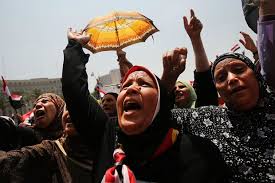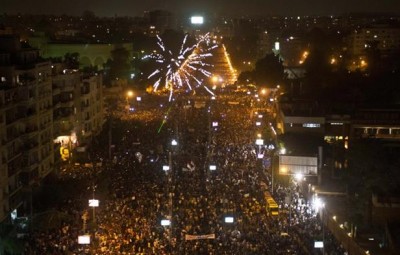 Mohammed Morsi, in office only a year as the first democratically elected leader of Egypt, was rousted from power by the military Wednesday as a euphoric crowd in Tahrir Square cheered his exit.
Mohammed Morsi, in office only a year as the first democratically elected leader of Egypt, was rousted from power by the military Wednesday as a euphoric crowd in Tahrir Square cheered his exit.
The commanding general of the armed forces, Gen. Abdel Fattah al-Sisi, said on Egyptian television that the constitution was suspended and that the head of the constitutional court would be the acting president. He said new elections would be held, with the timing to be determined later.
Armored vehicles, tanks and troops deployed throughout the Egyptian capital, the army seized the headquarters of state television, and the military convened a meeting with political opponents of Morsi and religious leaders.
Morsi was elected a year ago after Egyptians ousted Hosni Mubarak, the autocrat who had ruled for almost three decades. Egyptians hoped he would build a more pluralistic and tolerant country.
Instead, Egyptians have been frustrated by a struggling economy and poor services and infuriated by what they see as power grabs by Morsi — stifling the judiciary and forcing through a constitution that favored Islamists and ignored minorities.
Earlier in the day, advisers to Morsi said the military was staging a coup and subverting the will of the people.
In Tahrir Square, however, the military announcement was greeted with jubilation reminiscent of the first days of the Arab Spring two years ago. Tens of thousands of people shot fireworks, sang, danced, chanted and waved Egyptian flags.
The whereabouts of the president, an Islamist backed by the Muslim Brotherhood, were unknown. A day earlier, he had vowed to stay in power and said he was prepared to die for the cause.
The ouster will remake the politics of the Middle East at a volatile time. Egypt is the most populous country in the region, has a peace treaty with Israel and is a partner of the United States. The Obama administration declined to take a side in recent days, saying only that it was committed to democracy.
The meeting convened by the military earlier in the day included Mohamed ElBaradei, the former head of the U.N. nuclear weapons agency and a critic of Morsi, as well as a leading Sunni Muslim cleric and the head of Egypt’s Coptic Christians.
The military had given Morsi 48 hours to step aside or share power. In a statement posted to Facebook in the final hours before the deadline, the military swore its own fight to the death.
“We swear to God to sacrifice with our blood for Egypt and its people against any terrorist, extremist or ignoramus,” the military said in a statement. “Long live Egypt and its proud people.”
At least 16 people were killed and more than 200 injured in clashes, primarily around Cairo University.

In Washington, the State Department said it before the military announcement that it could not confirm reports of a coup but was watching the situation closely. The U.S. Embassy warned Americans in Egypt to avoid large gatherings and monitor local news.
The military was believed to have given the president until 5 p.m. local time, or 11 a.m. ET, to meet the demands of the protesters. The ultimatum, issued Monday, had been denounced by supporters of Morsi as a military coup.
At state TV headquarters, non-essential staff were told to go home early, and Reuters reported that the building was being guarded by armored vehicles. The Associated Press reported that military officers were monitoring broadcasts.
There were other signs that support for Morsi was slipping, even among sympathizers. A senior member of a hardline Islamist party allied with the president told Reuters that the party was trying to broker a peaceful transfer of power to avoid bloodshed.
“We find ourselves faced with the necessity of convincing the president to accept a referendum on early presidential elections,” Tarek al-Zumar of Gamaa Islamiya said in a telephone interview. “This is what we hope will be reached in the next few hours.”
The Obama administration and the United Nations had encouraged Morsi to listen to his people.
Pentagon officials said Defense Secretary Chuck Hagel had called his Egyptian counterpart. Spokesman George Little called the situation in Egypt a crisis and added the hope that “this period of tension can be resolved in a peaceful manner and violence can be avoided.”
The opposition Dustour Party, whose name means Constitution, said Morsi was leading the country toward violence. It asked the army to protect the people “after Morsi lost his mind and incited bloodshed of Egyptians.”
The military has said it will impose its own “road map” for the future if Morsi does not meet the protesters’ demands.
In a loud, passionate, 45-minute speech to the country, Morsi on Tuesday blamed loyalists of Mubarak, his predecessor, for fighting against democracy and challenging his leadership through the current wave of protests.
He asked Egyptians not to confront the military or use violence against its forces, the police or the interior ministry. Earlier in the day, he had demanded that the armed forces withdraw their ultimatum.
The crisis could have a significant effect on the global economy. The benchmark price of crude oil for delivery in August rose above $102 in electronic trading on the New York Mercantile Exchange, the highest since early May last year.
Egypt’s control of the Suez Canal — one of the world’s busiest shipping lanes, which links the Mediterranean with the Red Sea — gives it a crucial role in maintaining global energy supplies.
NBC News

Leave a Reply
You must be logged in to post a comment.